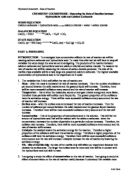Andrew Mckean
Rate of reaction coursework
Calcium carbonate reacts with hydrochloric acid producing calcium chloride, water and carbon dioxide.
CaCO3(s)+ 2HCl (aq) ----- CaCl (aq)+ H2O (L)+CO2 (g)
Theory
The things that could affect the rate of the reaction are surface area, concentration, temperature and catalyst. I will change the concentration of the HCl this should prove that the reaction of the HCl with calcium carbonate should be slower if the HCL is more concentrated.
Prediction
In my experiment I will predict that when I change the concentration of the hydrochloric acid the rate of the reaction will increase, because there is more acid then there will be more collisions therefore there will be more gases coming of the limestone, if I start to add water to the hydrochloric acid the rate of the reaction will be slower because their will be less collisions of the molecules. I will change the concentration of the acid by adding water to it. This will be the one that I am going to change because it will be easy and accurate.






